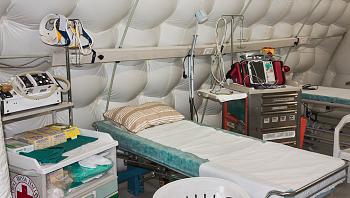Swiss doctors ask patients over 60 to sign “Do Not Resuscitate” order in advance
(Natural News) Warning that Switzerland’s intensive care units (ICUs) are nearing full capacity, Swiss physicians urged people who are vulnerable to contracting COVID-19 to sign end-of-life “Do Not Resuscitate” (DNR) orders in an effort to ease the pressure on overwhelmed ICUs.
People considered vulnerable are those aged 60 years and older, as well as people with pre-existing conditions like diabetes, cardiovascular disease and chronic respiratory diseases.
Pro Senectute Schweiz, an organization for the elderly, blasted the advice, which they labeled “excessive.” They also said that the advice was premature, especially given how the country’s ICU capacity is not currently at risk of running out of beds, contrary to what physicians claim.
However, the Swiss Society for Intensive Care Medicine (SGI) insisted that individuals particularly susceptible to the coronavirus should put their wishes on paper should they contract the disease and lose the ability to talk to medical staff.
In a statement, the SGI said that signing end-of-life orders will support both the patients and the medical staff in the ICU.
A call for responsibility, not sacrifice
A DNR order is a medical order written by a physician and signed by a patient. It instructs healthcare workers not to perform cardiopulmonary resuscitation (CPR) if a patient’s breathing stops or if the heart stops beating.
While controversial, DNRs are often doled out in cases when survival rate is extremely low, such as if a patient is terminally ill or in hospice care.
In a statement, Pro Senectute Schweiz acknowledged that the call by the SGI for vulnerable individuals to sign DNR orders can be considered sensible advice in normal times.
However, Switzerland is yet to face an “absolute emergency situation” that would warrant such an appeal. The advice created an impression of urgency inappropriate for a decision that demands deep consideration, added the group.
Responding to this, SGI President Thierry Fumeaux, who also works at an ICU unit in the Swiss town of Nyon, said that the advice is not “a call for sacrifice.” Instead, it is just a call for people to take responsibility for their autonomy.
Moreover, Fumeaux said that the advice to sign end-of-life DNR orders was about thinking ahead, rather than attempting to cause panic in individuals who might face a heightened risk of suffering from complications due to COVID-19. The message should also not be misconstrued to mean that vulnerable people should not get the same care as others, added Fumeaux.
On Monday, Nov. 23, Swiss health authorities reported that 410 new COVID-19 patients were hospitalized. As of the time of writing, Switzerland has 309,469 confirmed COVID-19 cases and 4,393 COVID-19 deaths, as per the Johns Hopkins University‘s Coronavirus Resource Center.





